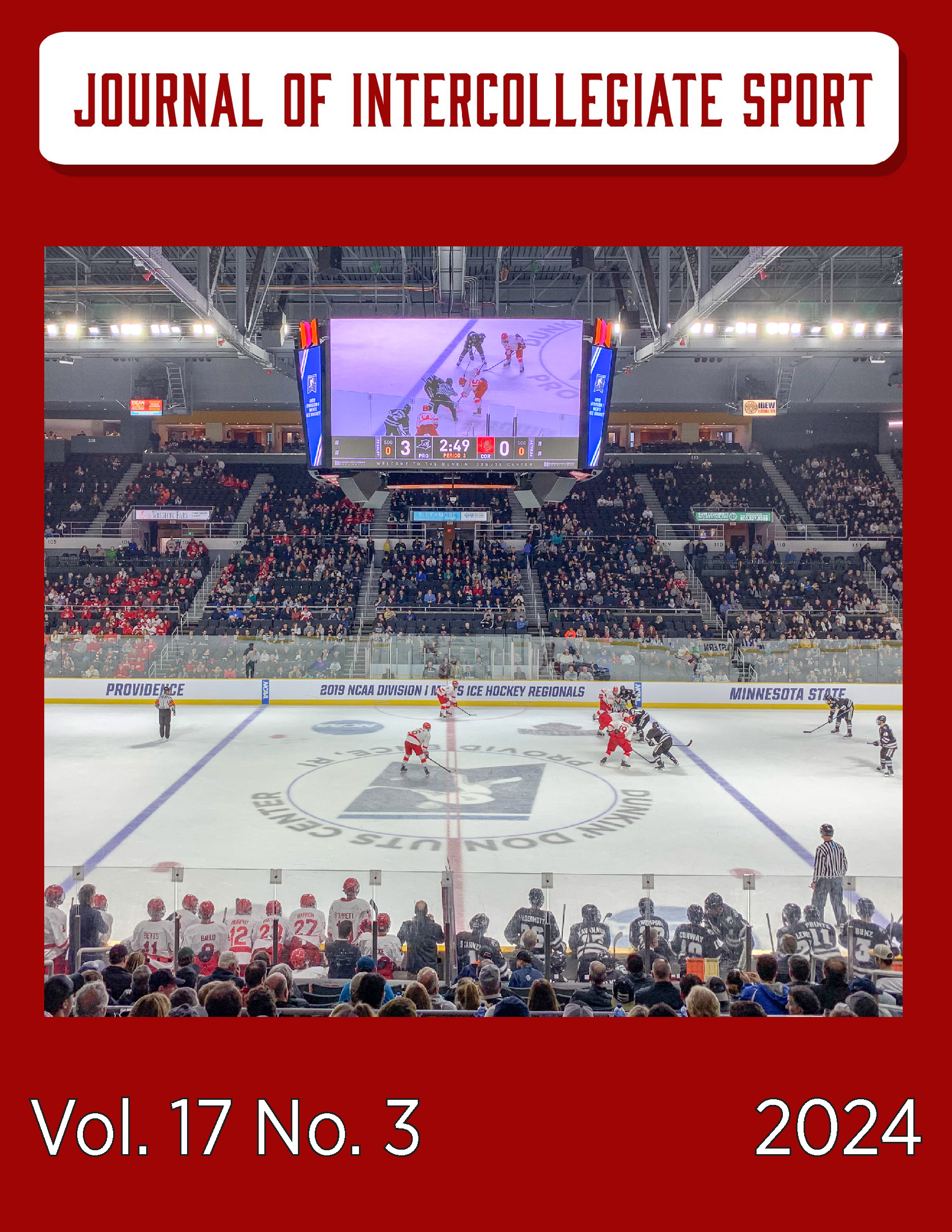An Exploration of Student-Athletes Perception on the Athletic Trainer/Coach Relationship: Case Study on Social Support
DOI:
https://doi.org/10.17161/jis.v17i3.18209Keywords:
social support, student-athletes, athletic trainers, coachesAbstract
Prior research has examined perceptions by the athletic trainer, the coach, and even the student—athlete however it has not explored the student-athletes perception of the athletic trainer coach relationship and weather that impacts social support received. The goal of this study was to explore how the athletic trainer/coach relationship may impact social support through the perception of Division I intercollegiate student—athletes. Interviews were scheduled and held in places based on research participants’ choices. After 11 interviews had taken place, conceptual saturation was reached, and it was decided to stop recruiting research participants and interviewing. Data was analyzed using open, constant comparison, axial, and lastly selective coding. The results were consistent with previous research on athletic trainers and coaches being major contributors of social support for student—athletes. Our findings indicated a correlation between positive athletic trainer/coach relationships and a positive student-athlete experience overall. In contrast, it also showed a correlation between negative athletic trainer/coach relationships and a more negative student-athlete experience overall. While not the intended findings, our research also highlighted the significance of pressures faced by student-athletes to play while injured and the prevalence of mental health issues.
Downloads
References
References
Baxter, P., & Jack, S. (2008). Qualitative case study methodology: study design and implementation for novice researchers. The Qualitative Report, 13(4), 544-559. Retrieved from https://nsuworks.nova.edu/tqr/vol13/iss4/2
Chichirez C. M., & Purcărea V. L. (2018). Interpersonal communication in healthcare. Journal of Medicine and Life, 11(2), 119-122.
de Groot, A. L., Weaver. A. G., Brown. S. N., & Hall. E. (2018). Social support provided to injured student-athletes. Journal of Issues in Intercollegiate Athletes, 11, 168-188.
Hatteberg, S. J. (2020). Collegiate athletes use of perceptions of institutional sources of support for role-related stressors. Journal of Issues in Intercollegiate Athletics (Special Issue), 98-123.
Hayden, L. A., & Lynch, M. (2011). The role of ATs in helping coaches to calculate return to play. International Journal of Athletic Therapy and Training, 16(1), 24–26. doi: 10.1123/ijatt.16.1.24
Hupcey, J. E., & Morse, J. M. (1997). Can a professional relationship be considered social support? Nursing Outlook, 45(6), 270-276.
Kroshus, E., Baugh, C. M., Daneshvar, D. H., Stamm, J. M., Laursen, R. M., & Austin, S. B. (2015). Pressure on sports medicine clinicians to prematurely return collegiate athletes to play after concussion. Journal of Athletic Training, 50(9), 944–951. doi: 10.4085/1062-6050-50.6.03
NCAA Well Being. (n.d). Retreived February 7, 2020 from http://www.ncaa.org/opportunity/#well-being
Noble, J., Vermillion, M., & Foster, K. (2016). Coaching environments and student-athletes: Perceptions of support, climate and autonomy. Sport Journal, 2. Retrieved from https://search.ebscohost.com/login.aspx?direct=trueandAuthType=cookie,ip,cpid,athens,shibandcustid=s8863137anddb=s3handAN=117819169andsite=eds-liveandscope=site
Oliver-Hoyo, M., & Allen, D. (2006). The use of triangulation methods in qualitative educational research. Journal of College Science Teaching, 35(4), 42-47.
Rosenfeld, L. B., Richman, J. M., & Hardy, C. J. (1989). Examining social support networks among athletes: description and relationship to stress. The Sport Psychologist, 3(1), 23–33. doi: 10.1123/tsp.3.1.23
Robbins, J., & Rosenfeld, L. (2001). Athlete’s perceptions of social support provided by their head coach, assistant coach, and athletic trainer pre-injury and during rehabilitation. Journal of Sport Behavior, 24(3), 278-297
Scott, D. (2014). Contemporary leadership in sport organizations.
Champaign, IL: Human Kinetics.
Strauss, A. Corbin, J. (1998). Basics of qualitative research: techniques and procedures for developing grounded theory. Sage Publications.
Unruh,S., Unrah, N., Moorman, M., & Seshadri, S. (2005). Collegiate student athletes’ satisfaction with athletic trainers. Journal of Athletic Training, 40(1), 52-55.
Yang, J., Peek-Asa, C., Lowe, J. B., Heiden, E., & Foster, D. T. (2010). Social support patterns of collegiate athletes before and after injury. Journal of Athletic Training, 45(4), 372–379. https://doi.org/10.4085/1062-6050-45.4.372
Downloads
Published
Issue
Section
License
Copyright (c) 2024 Nikki Owens, Emeka Anaza

This work is licensed under a Creative Commons Attribution-NonCommercial-NoDerivatives 4.0 International License.
Copyright is held by the authors.


